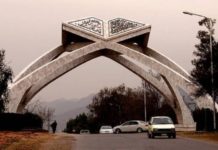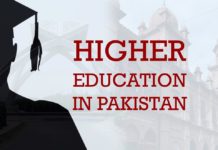The Eqbal Ahmad Centre for Public Education (EACPE) seeks to foster the use of science and reason to understand nature and society and so better enable all citizens of Pakistan to participate fully in the political, social, economic, and cultural life of their society; to exercise their democratic rights and responsibilities; to value human rights, democracy and the rule of law; to promote cultural and religious diversity; to raise awareness of global issues and the natural environment; and to advance the goals of international peace and justice.
EACPE is named to honour the life and work of distinguished Pakistani academic, activist, and public intellectual, Dr. Eqbal Ahmad.
“The EACPE record is very impressive, and hopeful — a rarity these days. About the webpage (design), I don’t have anything useful to say. Have little experience that’s relevant. To me personally, the range and choice of topics is appealing and impressive. I can’t think of any useful way to improve it.”
— Noam
(Received on 5th May, 2017. As a member of the EACPE board, Professor Noam Chomsky was asked to suggest how to improve our main page)









Sir What do you think the quality of higher education in Pakistan except the special cases of corruption ?
Here’s a part of letter that I sent to HEC and some other senior Pakistani academics about a year ago. Not surprisingly, nothing happened (not even an acknowledgement):
“In the past, I have helped several students connect with possible examiners and sent them lists of colleagues in various parts of the world who might be good examiners. However, I have had a series of negative comments from my colleagues regarding many of these PhD experiences and therefore have stopped doing this. I didn’t want to share these reasons with the student, but I do think that it is important for you to know about this and to perhaps consider ways of trying to remedy the situation. It is, I strongly believe – and I imagine that you are already cognisant of – in the best interest of Pakistani academia and academics to respond to these issues; without it, Pakistani PhDs will lose credibility in a global market and that will have extremely negative consequences.
– Students approach the examiners directly (sometimes in a emotionally charged appeal), rather than supervisors (or other people in position of responsibility)
– When the university approaches a potential examiner, they are not sent an abstract of the work (only a working title)
– The quality of research is usually very weak; a lot of students simply put in tables upon tables of unanalysed data based on large surveys in their results section, with little or no interpretation of the results
– When examiners write a negative report and/or ask for (major) revisions, they never hear back from the candidate or the university (in a few cases that I tried to follow up on, I was told that the report was received, but since it was negative, it was discarded (thrown away) and marked as ‘not received’ and then a different examiner was approached)
– The universities promise to pay a nominal fee for the services (which is quite low in comparison to other countries), but that this is never actually sent; in one case a check was received 16 months after the work was done and when the person submitted the check, they were told that the check had already expired! The person returned the check to the university, but never received a replacement check!
These are just a few issues that have been brought to my attention by colleagues. I would not be surprised if there are not other such issues as well. I believe that it might be worth the while to resource a credible research report looking into these issues that both identifies the issues and provides a set of suggestions that can be adopted to stop the situation from getting any worse.”
In Pakistan Education has become an Industry. With this Higher Education is not easily understood by every one! i mean the educated one.In QAU for eg., a fleet of PhD’s have passed out since 2010.
As their standards can not be challenged so is the case with the group of intellectuals, so called have started with assessing the PhD work of students here, like one that science academy use to do for science matric students in Islamabd….they actually review and write down the Phd text……
Interesting talk. Now that the problem has been identified/exposed, what is being done to alleviate the ill effects?
HEC was given a huge mandate in a setting that was not ripe for such intellectual undertaking. Perhaps investment in good quality basic education would have yielded better results in the same time frame.
Dear, very good discussion I watched on Corruption in Higher Education. Some very important points were missed by Dr. Isa Daudpota: Firstly, the quality of classroom teaching deteriorated terribly, because the so called researchers concentrated more on increasing the number of fake publications and used even universities time and resources instead of taking care of their classes. On the other hand, the committed teachers concentrated on their teaching work. Resultantly, the good and really committed teachers were forced to remain out of the ladder of promotion in the name of ‘research’. Secondly, if you analyze the names of writers, in many many and still many many cases, the names of faculty members were just included in the list of contributors by the main writers/researchers who happened to be the poor students of those faculty members, while those faculty members managed to get those papers published in different journals. Lastly, the question is: Is the system still not ashamed of this corruption? These comments are not meant to obviate the need and importance of genuine research in the country.
In a corrupt society (like Pakistan) we can expect more than this. The horrible thing is that our people have become corrupt now because our leaders intentionally allowed them for small corruptions in order conceal their own huge corruptions
Very important questions raised and, indeed, ably discussed. Quite rightly summed up that its ultimately lack of academic honesty and integrity that largely explains the pathetic state higher education in Pakistan—-despite all the money showered that only bred greater greed and academic corruption. To carry this debate forward, may I add a few hitherto unexplored and less discussed areas of academic-cum-administrative malpractices in higher education, based on my past association with the Quaid-i-Azam University:
1) Fabricated foreign referee reports for promotion/appointment as Associate and full Professors: Conversion of ‘negative’ into ‘positive’ referee reports on locally printed (or otherwise obtained) blank letterheads in connivance with all concerned, all the way up. The older generation of science faculty would know it all, dating back to many past decades.
2) Fabricated external/foreign referee reports on locally submitted doctoral dissertations: Not just conversion of ‘negative’ into ‘positive’ reports but producing entirely ‘original’ fabricated reports, obviously ‘positive’, as if received from the referred external referees (never actually referred to but only shown on file). The last such innovation was in very recent years, exposed only on unrelenting insistence of one dissenting committee member who questioned the similarity in language (typical Pakistani English) and content of the two referee reports supposedly received (but denied having been ever sent by both) from two different continent.
3) False information on application form for faculty positions: # of M. Phil/Ph.D. dissertations supervised. Any # up to 20 for actually just 1 or 2.
4) False list of publications ‘accepted for publication’: To complete minimum required #s, certificate from the journal with title of publications ‘accepted for publication’ submitted to get selected, that title never ever published…..perhaps a mere title to get through the selection process. This mosty involved local journals and friend out there to help you out.
On the teaching side, anonymous student evaluation of the faculty (practiced worldwide and in our major private universities as well) was long resisted by a majority of the faculty in QAU until I left many years ago and presumably in other public universities as well. I believe some kind of student evaluation is now in place, though not comparable to private universities. Perhaps the same applies to quality and content of course outline, quality of teaching, student guidance, etc, online, e-group usage, etc in public universities (compared to FAST, SZABIST, etc). As far plagiarism, at all levels, I leave the subject to others. As far command of English, the language in use for higher education, there is decline all over and at least one factor in keeping the standard of higher education low, especially in social sciences. I have always been a proponent of ongoing year-round (including summer) intensive non-credit English language courses in our universities to enable students (and even young faculty) to improve their English language competence to enhance their academic skills and professional growth….to the extent affected by the language handicap.
With malice to none.
Raja Ehsan Aziz
reaziz@gmail.com
Like other institutions of Pakistan, Higher Education is one of top corrupt institution.
Both Pervez Hoodbhoy and Dr Isa Daudpota for whom I have highest regards are not just only very qualified and extraordinarily competent academia, they are also real asset for Pakistan. They have ably discussed academic corruption which is fast becoming national-métastase…. And HEC is nothing but mockery of education… HEC should rather stand for Highest Ever Corruption. God Bless Pakistan heading I don’t know in which direction.
I agree with quality differences in Ph. D. research but doesn’t it exist in the developed world also. In fact the quality of research beside other factors is judged by the name of the supervisor who ensure that their students do not tarnish their reputation by substandard work. I strongly disagree with the views that we should abandon the research requirement because it has faults which will amount to throwing the baby with the bath.